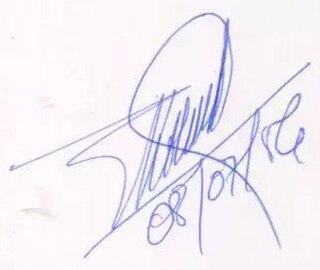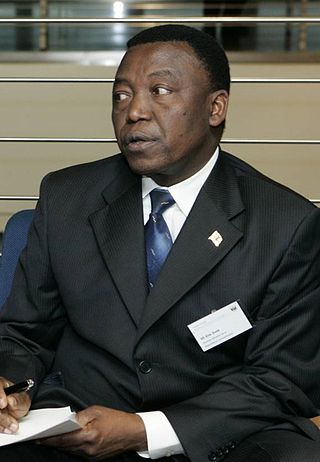
David Dacko was a Central African politician who served as the first President of the Central African Republic from 14 August 1960 to 1 January 1966 and as the third President of the Central African Republic from 21 September 1979 to 1 September 1981. He also served as Prime Minister of the Central African Republic from 1 May 1959 to 14 August 1960. After his second removal from power in a coup d'état led by General André Kolingba, he pursued an active career as an opposition politician and presidential candidate with many loyal supporters; Dacko was an important political figure in the country for over 50 years.

André-Dieudonné Kolingba was a Central African politician, who was the fourth President of the Central African Republic (CAR), from 1 September 1981 until 1 October 1993. He took power from President David Dacko in a bloodless coup d'état in 1981 and lost power to Ange-Félix Patassé in a democratic election held in 1993. Kolingba retained the strong support of France until the end of the Cold War in 1992, after which both internal and external pressure forced him to hold presidential elections which he lost.

Martin Ziguélé is a Central African politician who was Prime Minister of the Central African Republic from 2001 to 2003. He placed second in the 2005 presidential election and is currently the President of the Movement for the Liberation of the Central African People (MLPC).
Michel Gbezera-Bria is a Central African politician and diplomat. He was Prime Minister of the Central African Republic from 1997 to 1999. He is currently the CAR Ambassador to France.

Élie Doté is a Central African politician. He was Prime Minister of the Central African Republic from June 2005 to January 2008.

Anicet-Georges Dologuélé is a Central African politician who was Prime Minister of the Central African Republic from 4 January 1999 to 1 April 2001. Subsequently, he was President of the Development Bank of Central African States (BDEAC) from 2001 to 2010.
Jean-Luc Mandaba was Prime Minister of the Central African Republic from 25 October 1993 to 12 April 1995 under President Ange-Félix Patassé.
Timothée Malendoma was a Central African politician who served as the 12th Prime Minister of the Central African Republic from 4 December 1992 to 26 February 1993. He was the President of the Civic Forum party.
Enoch Derant Lakoué is a Central African politician who was Prime Minister of the Central African Republic from 26 February 1993 to 25 October 1993.
Édouard Frank is a Central African magistrate and political figure. He was Prime Minister of the Central African Republic from 15 March 1991 to 4 December 1992.
Simon Narcisse Bozanga was a Central African politician. He was Prime Minister of the Central African Republic from 4 April 1981 to 1 September 1981, when his government was overthrown by a military coup.
Henri Maïdou is a Central African retired politician who served as Prime Minister of the Central African Empire from 14 July 1978 to 26 September 1979, and Vice President of the Central African Republic in the cabinet of David Dacko from 26 September 1979 to 22 August 1980.

Bernard Ayandho was a Central African politician and diplomat. He was Prime Minister of the Central African Republic from 26 September 1979 to 22 August 1980.

Marie-Josèphe Zani-Fé Touam-Bona was a politician in the Central African Republic (CAR). She was the country's first female government minister.

Minister of Finance and Budget of the Central African Republic is a government minister in charge of the Ministry of Finance and Budget of Central African Republic, which is responsible for public finances of the country.
Jean-Pierre Sohahong-Kombet was a Central African diplomat and politician who served in different diplomatic posts at the Central African Republic embassies and as minister of foreign affairs in 1981.
Michel Ernest Alexis Gallin-Douathe was a Central African diplomat and politician who served in two different ministerial positions during the Second Dacko Presidency.
Gaston Banda-Bafiot was a Central African engineer, diplomat, and politician who served as the Minister of Mines and Geology and Minister of Energy.
Théodore Dabanga is a Central African banker and economist who served as Minister of Finance and Budget during Bozize's administration.
Alphonse Koyamba was a Central African economist and politician who held two ministerial positions during the Bokassa government.









